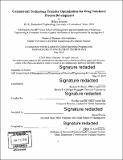Commercial technology transfer optimization for drug substance process development
Author(s)
Doucette, Hillary.
Download1119537637-MIT.pdf (11.41Mb)
Other Contributors
Sloan School of Management.
Massachusetts Institute of Technology. Department of Electrical Engineering and Computer Science.
Leaders for Global Operations Program.
Advisor
Richard D. Braatz and Thomas Roemer.
Terms of use
Metadata
Show full item recordAbstract
Commercial technology transfer for biopharmaceuticals is the process of transferring process and product knowledge between process development and manufacturing organizations to achieve product realization. This process often occurs before phase 3 of clinical trials, where speed and agility are critical for preventing delays in clinical programs and ensuring commercial site readiness ahead of regulatory approval. As the market is evolving with new modalities and subsequent operational challenges, there is a heightened need to optimize the technology transfer process to sustain growth of products entering an organization's pipeline. This graduate research project seeks to understand the business process workflow of commercial tech transfer and characterize its dynamics using discrete event simulation. Through this quantitative technique of business process modeling, knowledge regarding process bottlenecks and system constraints were revealed, leading to the identification of operational efficiencies which suggest a potential 19.5% reduction in lead times and 31.3% increase in organizational capacity. Furthermore, this work provides a platform for predicting program timelines and resource needs based on preliminary transfer requirements. These predictions can be updated in a Bayesian fashion for real-time project scheduling and capacity planning.
Description
Thesis: M.B.A., Massachusetts Institute of Technology, Sloan School of Management, 2019, In conjunction with the Leaders for Global Operations Program at MIT Thesis: S.M., Massachusetts Institute of Technology, Department of Electrical Engineering and Computer Science, 2019, In conjunction with the Leaders for Global Operations Program at MIT Cataloged from PDF version of thesis. Includes bibliographical references (pages 69-72).
Date issued
20192019
Department
Sloan School of Management; Massachusetts Institute of Technology. Department of Electrical Engineering and Computer Science; Leaders for Global Operations ProgramPublisher
Massachusetts Institute of Technology
Keywords
Sloan School of Management., Electrical Engineering and Computer Science., Leaders for Global Operations Program.